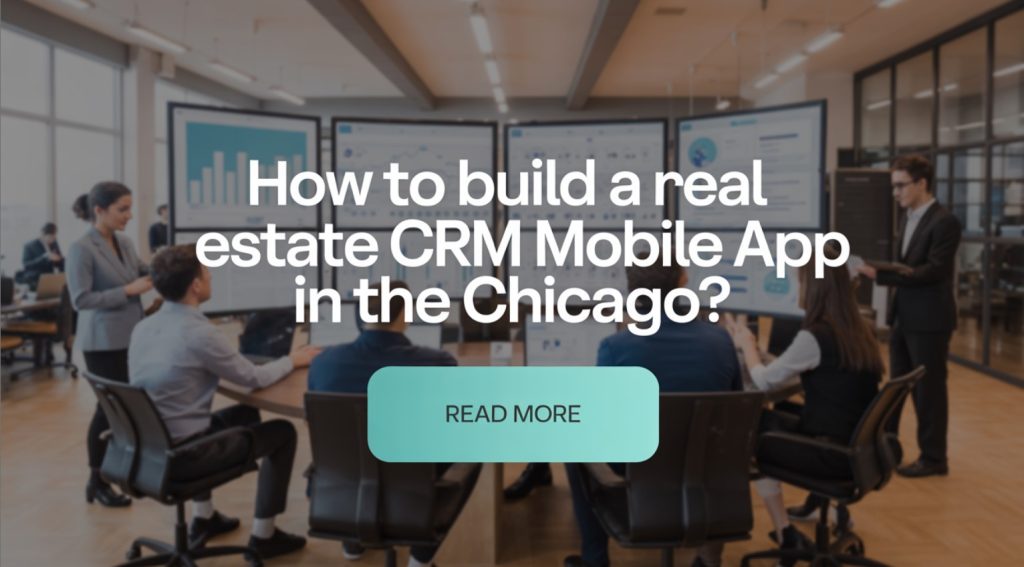How to Build a Real Estate CRM Mobile App In The Chicago?

The real estate industry in Chicago is one of the most dynamic in the United States, featuring a competitive housing market, commercial investment and diverse customers with high growth rate. But how to take advantage of this flourishing industry? In order to flourish in such a sharp-transport environment, real estate professionals require devices that streamline communication, tracking, and improving customer experience. A Real Estate Customer Relationship Management (CRM) Mobile App is one such tool that can transform operations for realtors, brokers, and property manners.
This article will run you through a real estate CRM mobile app development in Chicago, covering market insights, necessary features, technical stacks, development stages, costs and compliance requirements.
Why Build a Real Estate CRM Mobile App in Chicago?
Chicago’s real estate market is not just good but complex. According to Industry Reports, The Chicago Housing Market Continues to see significant demand from both buyers and renters. Commercial real estate is also growing, with businesses seeking prime office spaces and mixed-use properties.
A custom CRM app helps real estate agencies in Chicago to:
- Manage leads efficiently: Realtors can track potential buyers, tenants, and investors.
- Automate Marketing: Sending property listings, promotions, or follow-ups boxes seamlessly.
- Improve Communication: Centralized messaging and notifications make customer interactions smoother.
- Boost Productivity: Brokers can focus on closing deals instead of handling repetitive tasks.
- Ensure Data Compliance: Apps can be built to comply with Illinois real estate and data protection laws.
With Rising Competition Among Brokers and Agencies in Chicago, a CRM app is no longer a luxury but it’s a Necessity.
Key Features of a Real Estate CRM App
When you are developing a CRM mobile app for the Chicago market, consider the following must-have features:
1. Lead & Contact Management
- Store buyer, seller and tenant details.
- Categorize leads by stage (New, Qualified, Under Negotiation, Closed).
2. Property Listings Integration
- Integrate MLS for Chicago real estate data (multiple listing service).
- Find filters for neighborhood, budget, property type, etc.
3. Automated Alerts & Notifications
Provide the facility of push information for price changes, new listings, or scheduled demonstrations.
4. Calendar & Appointment Scheduling
- Sink with Google calendar or outlook.
- Allow the clients to pretend directly through the app.
5. Document Management
- Store agreement, contract and property documents for legal aspects.
- Electronic signature support for rapid deals.
6. Analytics and Reporting
- Sales display dashboard.
- Market insights for neighborhoods such as Lincoln Park, Hyde Park, or Loop.
7. Communication equipment
- Integrate in-app chat, SMS, or email for better communication.
- Video call feature for virtual property tours.
8. Integration with payment gateway
Safe rent collection or deposit payment to ensure trust.
9. Multi-language support
Considering the diverse community of Chicago, support for Spanish, Polish and other widely spoken languages can be beneficial.
10. AI & Automation features (It IsOptional but powerful)
- AI-in-managed lead scoring.
- Chatbots for immediate reactions.
- Future analytics to suggest properties based on user preferences.
Tech stack for a real estate CRM mobile app
Since we have gone through the essential features, now let’s have a look at the right tech stack to decide your mobile app development company in Chicago for best outputs.
The correct technology ensures stack scalability, safety and smooth performance.
Frontnd (Mobile App):
- Flutter / react native (cross-platform for iOS and Android).
- Swift (iOS-specific), Kotlin (Android-specific).
For Backend:
- Node.js or Django for strong server-side operation.
- Firebase for real time database needs
Database:
PostgreSQL or MongoDB for structured and unarmed data.
Cloud hosting:
AWS, Google Cloud, or Microsoft Azure.
API and Integration:
- Zillow API or MLS API for Chicago Property Listing.
- Strip and PayPal for payment.
- Twilio for SMS/Voice.
Security and compliance:
- SSL encryption.
- Compliance with Illinois Real Estate License Act and GDPR/CCPA for data handling.
Step-by-Step Process to Make Apps
One of the crucial questions that you are curious to know is how to build a real estate app?
Step 1: Market Research and Requirement Collecting
- Analyze the real estate landscape of Chicago.
- Identify pain points for brokers and agents.
- Study competitive apps (eg, zillow, redfin, realtor.com) to find gaps.
Step 2: Define Features and User Roles
- Separate dashboard for brokers, buyers and administrators.
- Give priority to features for MVP (minimum viable product).
Step 3: Design Wireframe and Prototype
- Create UX/UI designs that focus on easy navigation.
- Use Chicago theme branding for localization.
Step 4: Choose Development Stack
- Integrate Native for performance (iOS/Android separately).
- Cross-platform apps (Flutter/react native) for cost-patriotism.
Step 5: Backend Development
- Set server, database and API.
- Enable safe login through biometric authentication.
Step 6: Frontend Development
- Create a mobile app screen.
- Economic property listing, chat and information.
Step 7: Testing and Quality Assurance
- Conduct functional, performance and safety tests.
- Test app in the actual Chicago neighborhood using local data.
Step 8: Launch and Monitor
- Publish on Google Play and Apple App Store.
- Post the backend on a safe cloud infrastructure.
Step 9: Post-Lanch Support and Update
- Provide technical assistance.
- Add advanced features like AI Chatbots and AR Property Tour to later updated versions.
Cost to Develop a CRM App in USA
Cost of app development in USA depends on several factors such as complexity, features and development team rates.
Average Cost of Development
| App stage | Estimated cost |
| Basic system | $30,000 to $250,000 |
| Highly complex | $70,000 to $250,000 |
Factors That Affect Cost:
- Having a local mobile app development company in USAlike Techgropsewill result in high cost but better market understanding.
- Outsourcing for offshore developers will be cost -effective but local insight may be lacking
- Number of integration (MLS, Payment Gateway, Chat).
- Design complexity.
Compliance and Legal Views in Chicago
While creating the CRM app for real estate in Chicago, ensure compliance:
- Illinois Real Estate License Act (RELA) – It is for the management of listings for agents and brokers.
- Data Safety Act (CCPA, GDPR) – If the user has to handle personal data.
- Fair Housing Act – Avoid discriminatory features or marketing.
- MLS Rules – This allows only licensed realtors to reach the listing database.
Working with a local lawyer or compliance specialist is appropriate during development.
Future Trends for Real Estate CRM Apps in Chicago
- AI in operated virtual assistant: Helping agents to immediately respond.
- Blockchain for transactions: Transparent and safe deals.
- Augmented Reality (AR) Tours: Allows customers to detect Chicago properties.
- iOT integration: Smart Home Insights for Potential Buyers.
Conclusion
The construction of a real estate CRM mobile app in Chicago is a strategic investment for agencies and brokers that want to be ahead in the competitive market. With features such as lead management, MLS integration, document storage and AI-operated insights, these apps can change the management of listing, and the way of closing deals.
By following the correct growth process, choosing the right technical stack, and ensuring compliance with Chicago and Illinois rules, businesses can launch a powerful tool that not only enhances efficiency, but also provides a better customer experience.
In the coming years, as Chicago’s real estate market continues to develop, people who embrace technology and create strong CRM solutions will lead the route under the guidance of an experienced mobile app development company in Chicago like Techgropse.




